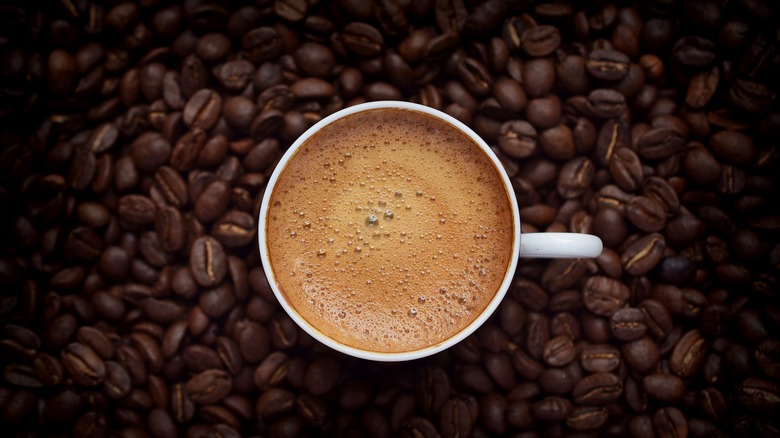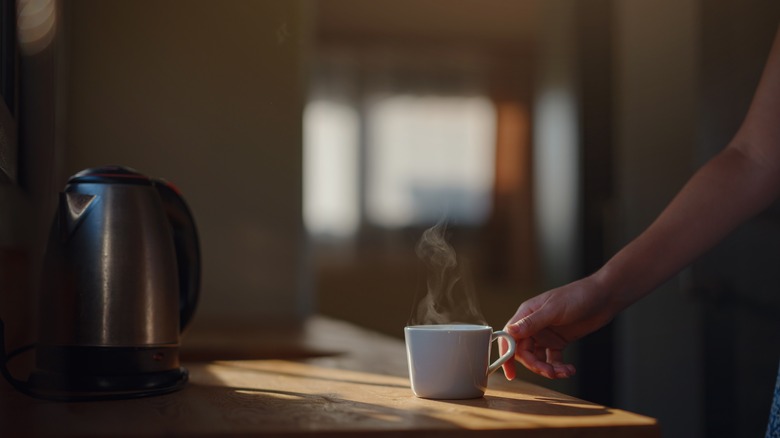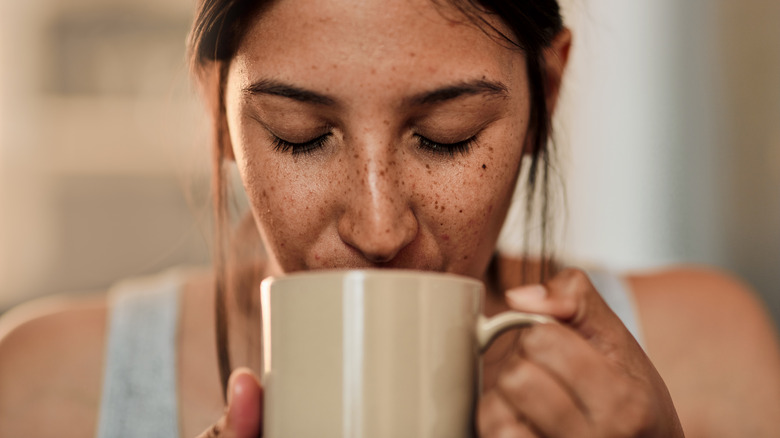Does Drinking Coffee Actually Help With Hangovers?
Many people have their supposedly tried-and-true hangover cures, and one of the things that's frequently touted as a surefire way to get rid of the headaches, nausea, and general aches and pains is coffee. The idea is that caffeine gives you a major boost that gets rid of — or at least takes the edge off — symptoms, and it sounds logical enough. But what does science have to say?
It turns out that most scientists seem to agree that no, coffee isn't going to hit the magic reset button and make your hangover go away. In fact, not only is coffee not a magic cure, but as of this writing, there is no cure for a hangover. Part of the problem is that the causes of hangovers are very complicated, and how you react to alcohol depends on your own genes and metabolism, as well as a slew of factors including how fast you drank, how much, and what you were drinking. Add in the difficulty sleeping, dehydration, and gastrointestinal distress, and in a nutshell? It's complicated.
So, where does coffee come in? While you might be tempted to grab an extra-caffeinated drink such as a red-eye coffee in hopes of getting a major caffeine kick, it turns out that not only is it not a scientifically proven hangover cure, but some people can find coffee making their hangover even worse. If you overindulged on, say, some delicious but intense cocktails that clocked in at over 40% ABV, coffee isn't going to help.
Science says there are a few big problems with using coffee as a hangover cure
While a good, strong cup of coffee might seem like it's going to help with that hangover, it's actually doing the opposite. Dehydration is one of the biggest contributing factors to a hangover, and coffee has diuretic properties that can make you lose more fluids instead of replenishing them. Dr. Mary Claire O'Brien is a professor of emergency medicine at Wake Forest University School of Medicine, and she told Wine Spectator that "if a person is dehydrated and hungover, drinking beverages with caffeine as a remedy might actually exacerbate their dehydration." (Other drinks can also increase dehydration, such as soda, tea, and some energy drinks.)
That's not all that's going on here, either. Drinking coffee can also make symptoms like nausea worse, too. That caffeine that you might be relying on to wake you up can also make you feel worse if you're sleep-deprived: It might make you more alert, but you'll just be feeling the effects of that hangover — and the lack of sleep — much more strongly.
Caffeine does a few other things that can make hangovers worse. Since blood vessels constrict and blood pressure rises in response to caffeine, that can make your headache worse. If you've ever pounded coffee on an empty stomach and felt shaky afterward, consider this: That shakiness can end up compounding the tremors that come with a hangover. Bottom line? Coffee might just be making things worse.
Drinking coffee alongside alcohol doesn't work, either
Many people have tried to come up with their own ideas about curing hangovers and preventing them in the first place, and on that note, you may have heard that drinking caffeine alongside alcohol will give your body the boost it needs to process that alcohol faster. That, says O'Brien, also isn't true.
The body deals with and processes alcohol and caffeine in completely different ways, and generally speaking, caffeine is going to get processed faster. That means you might get the benefits of alertness and wakefulness while you're drinking, but it's going to wear off faster and it might just leave you suffering even more. Why? According to Harvard Health Publishing Chief Medical Editor Howard E. LeWine, MD, drinking caffeine with alcohol can make you feel less drunk at the time, and with your body not sending you hints that it's time to slow down, it might mean you're less likely to self-regulate what you're drinking.
The bottom line is that coffee is likely to make you feel worse, not better. While there's no cure-all, medical experts suggest sleep, drinking water or sports drinks, and taking vitamin B6 to help ride out a hangover. (Tylenol and other products containing acetaminophen can actually make matters worse, as it slows down liver function and your ability to process alcohol.) As for prevention? O'Brien says, "As a physician, I would say the best hangover cure is moderation."


